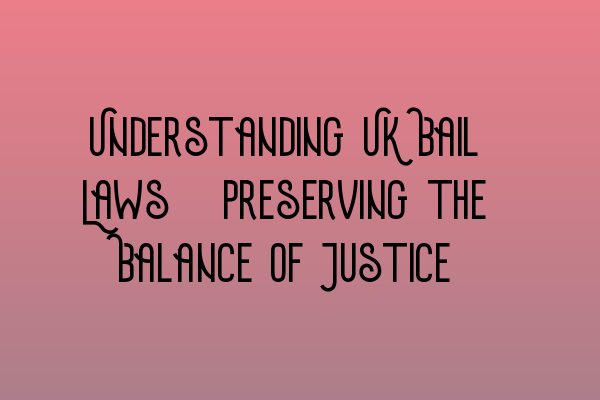Understanding UK Bail Laws: Preserving the Balance of Justice
When it comes to criminal law in the UK, the concept of bail plays a crucial role in upholding the principles of justice. Bail is a process through which individuals accused of a crime are released from custody before their trial, with certain conditions applied to ensure their appearance in court. In this article, we will explore UK bail laws in detail, explaining the factors considered in granting bail, the types of bail available, and the importance of striking the right balance between personal liberty and public safety.
Factors Considered in Granting Bail
Before granting bail, UK courts carefully consider various factors to assess the risk associated with releasing an individual. The court takes into account the severity of the crime, the defendant’s criminal history, the likelihood of the defendant appearing for trial, and the potential risk of harm posed to the public or witnesses. By evaluating these factors, the court aims to make an informed decision that preserves both the defendant’s rights and the safety of society.
Types of Bail
There are two main types of bail in the UK: police bail and court bail. Police bail allows individuals to be released while they are under investigation, before any formal charges have been made. On the other hand, court bail is granted after the defendant has been charged and appears in court. Court bail may include conditions such as reporting to a police station, surrendering travel documents, or living at a specified address. These conditions aim to ensure that the defendant does not pose a flight risk or danger to the public.
The Importance of Bail in Preserving Justice
Bail serves as a crucial tool in preserving the balance of justice within the UK legal system. It recognizes that individuals are innocent until proven guilty and allows them to continue with their lives and prepare for their defense while awaiting trial. Without the opportunity for bail, individuals charged with a crime might be forced to spend extended periods in custody, potentially leading to negative consequences such as loss of employment, strain on family relationships, and a compromised ability to build a strong defense.
However, it’s important to strike the right balance between granting bail and protecting public safety. UK courts are vigilant in their assessment to avoid releasing individuals who may pose a threat to society or interfere with the course of justice. The conditions imposed on bail help mitigate these risks, ensuring that the rights of the accused are not prioritized to the detriment of public safety.
If you are interested in learning more about the UK legal system or preparing for your SQE 2 exams, we offer comprehensive courses to help you succeed. To enhance your knowledge of criminal law, you may also want to explore our SQE 1 Practice Exam Questions and SQE 1 Practice Mocks FLK1 FLK2 articles. Stay informed about important legal dates and exam schedules by visiting our page on SRA SQE Exam Dates.
